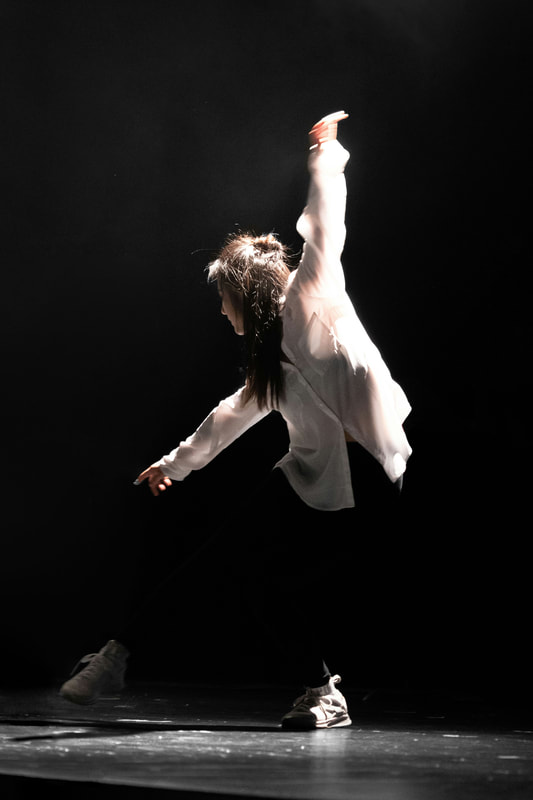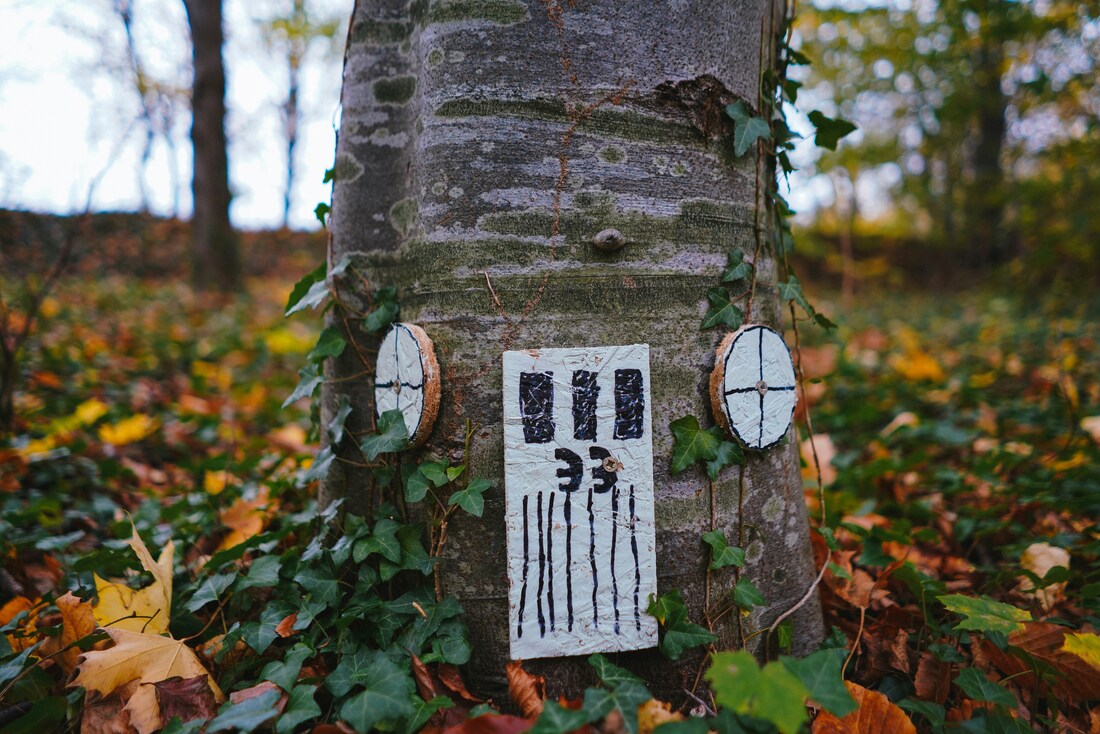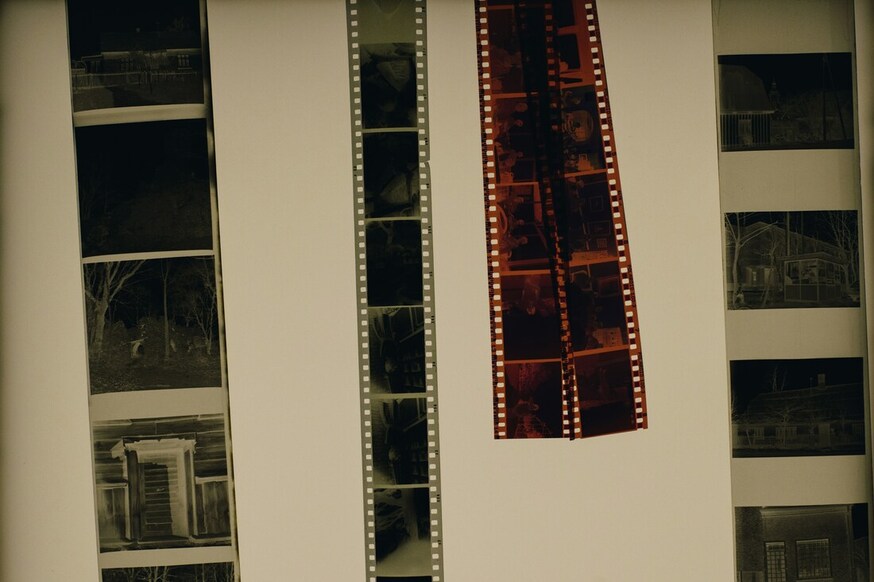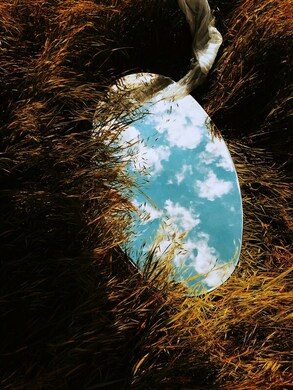|
You asked me to come, and I did, even though I knew it was wrong. In that city of beaten red clay and ramparts, you took my hand and led me through medieval keyhole arches and thin, ribbonlike passages meant to confuse the enemy and disperse the jinn. Some doors led to cool, leafy fountain courtyards. Other doors led to riads rotting from neglect. We were in the medina on the other side of the world, far away from anyone and anything familiar; we could do whatever we wished. We skipped through the souks admiring the beauty of the ordinary – this ancient stone, these odours of cinnamon, clove and rose. Brass lanterns and swords. Bins of talismans. We spied on men in long saffron robes smoking hookahs in their cafes. Young teenage boys cried out – Hey! Who are you? Where you go? I take you. – and we walked past them laughing, as if you already knew the way. You had finished your lectures, and the days unfurled before us now like a fresh piece of paper. Do you know where you’re going? – I asked, hearing the oddest thrill of excitement in my voice, looking vaguely round and letting myself be drawn further in. A bright-eyed boy sold the sweetest orange juice in the square and a suited man named Azeem had shone shoes beneath the clock tower for all his life. The barber, the cobbler, the tooth puller – each shop was nothing more than a wobbly chair. Children behind every shop counter cheated you of change but you didn’t care. You chuckled at the mule with a carburetor tied to its back and the crooked man who called out Balak! Balak! as they passed. From the tiny bakery, you chose a slice of the thousand-layer cake and ate it in three bites. In the mosque, you pointed out the calligraphy that was engraved on the ceiling and walls, the calligraphy that was almost everywhere in the city, you said. For these people had always believed that writing was sacred. Writing was their word of God. Outside, the smiling guard who’d been watching us mistook us for married, asking if this was the honeymoon. But no, I wanted to say, covering my hair again. There’s a wife who knows nothing of this. We are in the realm of the Forbidden. A man stepped out of a doorway and invited us into his carpet shop, away from the heat, and rug after rug was spread out before our feet as three cups of mint tea were poured. When we emerged, it was from a door on a different side and the scene had changed completely. A girl sat weaving in a dark room beneath a single bulb. A blind boy stood singing. ~ I woke from the dream (of what?), the call to prayer echoing through the sky. Come back, you said, pulling me in again and slipping a hand between my legs. ~ Every night at dusk, the main square filled with musicians and storytellers. An old man, remarkably tall and thin, held up various props – a giant ostrich egg and feather plume and sword – as he told tales of choices and danger and fate. A wide-eyed woman with a ruby on her forehead felt it her duty to translate to me. You have the eyes to see you are caught in one story, and the heart to know you could change it to another. We ate sheep brains at the stall of a boy who pointed the way to his brother’s rooftop bar, promising it had the best view of anywhere. Dozens of people just like us were there. You gave me a tiny pill and my heart quickened in beat with the drums. It was our last night and I spun round and round, the sounds echoing loudly within me because perhaps it was true that I was hollow at the core. In the morning, I’d leave, and you’d switch cities, and your wife and children would join you. I glanced up and saw you watching me from the other side without any expression at all. I am alone, I thought, leaning into the sparkly air. Sometime later, I went back down to search for the toilet. There, through the tiniest window, I looked into the yellow room across the alley where someone, sitting before a mirror, was drawing a picture of herself.
0 Comments
East Bay Times—July 5, 2021
At dawn, the sun is confirmed dead. Loss is heavy, eerie, foreign. Shoveling mounds of debris, oak, and rubble, I locate pieces of ruined porcelain—the head of Buddha, decapitated. I am learning how to mourn without tears the way my parents did after losing their home, their belongings in the Vietnam War, escaping by boat on hazardous seas, displaced and separated in refugee camps, immigrating to America with nothing but hope.
 Photo by Luke Brugger on Unsplash Behind the glass, corn cob bedding pillows the dead finch. Hilly plops into the faux velvet wingback chair, notices the dusty purple dawn filtering through the gauzy drapes. She must be the one who found the little birdy first, like she’d found Edgar unresponsive in the backyard, his joggers and flannel button-up sopping from the streaming garden hose he still clutched. Hilly remembers thinking Edgar’s face was milky and mottled. She can’t imagine that curdled face now. But she can picture Grampa’s waxy, gaunt cheeks and the brown ribbing on the lumpy easy chair where he still reclined, muscles stiffened into place, and the odd tilt to her voice when she phoned her mother with the news. Maryam enters the aviary, carting her supplies to feed the finches, clear their filth from the plastic vines, the ropes and perches, twine spherical roosts. Maryam had taught Hilly the little dead one is a zebra finch. Stripes and polka dots both, browns and greys. Maryam coos at the exotic little lifeless thing in soft public mourning. She advises Hilly to return to her room while Maryam cleans today. Hilly doesn’t. Maryam leaves to fetch an aide, returns alone, and says she’ll take you, Mrs. Moreland, just for today. Stout Maryam hoists Hilly to her walker and caresses Hilly’s hunched shoulder while they plod down the beige hallway, a beaten flat and dingy streak down the carpet’s middle. Don’t be sad about the finch, Mrs. Moreland. He lived a good life. There, sit in the big chair, Mrs. Moreland. Are you okay? Do you need water? Okay. Have a good day, Mrs. Moreland. Hilly looks out her window. Past the tidily manicured boxwoods, sparrows peck at the asphalt parking lot. Hilly watches. Jenny Severyn lives in Ohio with her husband. She holds a BA in English from Loyola University Chicago and an MLIS from Simmons University. Her work has appeared in Litbreak, Eunoia Review, and Apricity Press.
 Photo by Andy Holmes on Unsplash The trees are bare enough to see the squirrels’ nests. Frederick scratches his gray mustache and squints his weathered eyes, wondering how a creature could rest on such a fragile bed, at such great heights, amidst winds that could carry away a thin branch. During the spring and summer months, Frederick had spent every morning taking care of his beloved Mariana’s gravesite. He’d bring a pair of scissors in his back pocket, get down on his hands and knees, and make sure there wasn’t a single blade of grass out of place. A fresh set of daisies, strategically placed in a vase next to the headstone, would add a hint of delicate sun to the roughness of the stormcloud-colored granite. With winter on the way, Frederick knows it’s going to be a lot harder to keep Mariana’s headstone clear. The snow doesn’t care about the names it covers, and wool gloves just aren’t enough to warm hands that have been cracked for forty years. The daisies will shrivel up quicker, if they don’t disappear first. Frederick stands in front of Mariana’s headstone. He envisions himself lying peacefully in the plot next to her. When Frederick and Mariana got married, they’d always hoped that they wouldn’t ever be without each other for long. But when each minute feels like an empty lifetime, a day feels like another death. On the way home, Frederick’s walking stick taps against the sidewalk like a ticking clock. His walking stick has seen better days, but so has anything that has traversed the grounds of time. His back seems to hunch more with each step, his frown burrows deeper, and every breath becomes a bigger job when the cold air enters his lungs. The new neighbors whisper to each other from their porch, and Frederick turns away. It’s hard to face the world when you’re mourning your own. As Frederick approaches the walkway of his deteriorating Victorian house, he looks up and witnesses a squirrel falling from the birch tree in his front yard. The squirrel lands on the firm soil, pauses for a moment, frozen, then springs up and darts across the street as if nothing happened. Frederick steps into his home which doesn’t feel like home anymore. He hangs up his scarf, caresses the sleeve of Mariana’s old coat, and sighs. After making his way up the creaking staircase to his bedroom, Frederick lies down in his bed and stares at the ceiling. A gust of wind rattles the shaky windows. The height of his loneliness makes him feel dizzy. He contemplates whether he’ll ever be able to get back up again or not. He closes his eyes and wishes he could be like the squirrels.
You remind yourself not to run but look at you bounce up stairs. For dishes? Your journal? A tissue? Any excuse to step between here and there. There, there, the radiologist didn’t need to say, but she did say you’ll need a surgeon. And, even though you are just 29—short of 30, boob adulthood—a mammogram. You keep moving because you’ve been under strict orders to not increase your heart rate or engage in strenuous activity and you hit your limit. On your evening walk tonight, you were faster than yesterday. But you weren’t breathing hard, you told the air. It’s not as though you want your biopsy site to ruby. It’s not as though you seek infection. The good news is the lump isn’t cancerous, your radiologist began. With an opener like that, you knew there’s an And. But. Even so. Noncancerous but the lump could behave so—spread to other tissue, blossom and bloom your breast into an unbreastlike flower. But let’s stay away from any birds and bees metaphors. There will be no pollen here. Six months ago, you absentmindedly checked your breast while in the thick of busywork and your fingers met rubber within an instant. Call to campus health clinic two minutes before close. Emergency ultrasound. 6-month follow-up this week. Sudden ultrasound-guided core needle biopsy. You walked slowly for two days, post-biopsy, slower than pre-Industrial Revolution glacial melt. Lingered in Ace bandage. Iced with frozen spinach. When the greens thawed, you placed them back in the freezer. FDA-approved assistance? FDA still hasn’t approved the best chance of ending this pandemic. You could only hibernate for a day and a half, and only on these terms: still get your 10,000 steps, however sluggish. 13,500 yesterday, oops. There’s a world you must see. No turtle in sight, and herons might be gone for the summer, but look: ducks, squirrels, coots, bluebirds, and one luminous goldfinch. How to say you’ve considered your mortality since age 12? You made peace with the possibilities before ever placed beneath hands or a scope? So: you will dance. You will steal movement. Become a thief of motion. In a month or two, you’ll be put under. Cut with scalpel. But now? Thrill at this body, this body—all yours. Reece Gritzmacher lives in Northern Arizona in a mountain town surrounded by ponderosa pines, but grew up hugging trees in the Pacific Northwest. Their poetry and prose has appeared or is forthcoming on Barrelhouse, Sundog Lit, Bending Genres, Ghost City Review, and elsewhere. They are a Tin House Summer Workshop participant and hold an MFA from Northern Arizona University. You can find them at www.reecegritzmacher.com.
We fled under orders, tracking north along roads so new that the maps didn’t show them, sometimes so new that we had to lay them ourselves. Hardcore and tarmac. Burning palms blistering towards the Pole Star. We travelled by night and we travelled by day. We travelled by osmosis, by sleight of hand, and by a process akin to nuclear fission. We told no one our names, because names are power and we needed them to light our way, but we told ourselves lies to keep up morale and confuse the devil we knew was at our heels. At borders we became birds and rumours, and at rivers we became fish and superstitions. We fled under oath and never let ourselves down. Shadows sobbed as they took our hands. We fled under anaesthetic, and we still feel nothing but the dullest ache.
I am 12 years old and I have a whistle for a front tooth. I am 12 years old and I learn about two girls who tricked the world into thinking fairies were real and I wonder how they kept their dresses so white. Young girls are strange things and young women are even stranger. I am 12 years old and I am a young woman. Two girls put pictures of fairies on hatpins and someone calls them a miracle. Two young women claim to commune with paper cut outs and someone calls them a “mental disturbance.” I am 12 years old and I am a mental disturbance. I am 12 years old and I begin to hope that the growing pains are just like coming home in a white dress with wet feet, that I am on the cusp of evolutionary perfection and my theosophical burgeoning is nothing but a lazy skipping of stones until something better happens to me. Two girls make a product of their potential, print it on glass plates and hold their tongues. I am 12 years old and there are grooves in my tongue for fingernails. I am 12 years old and I am learning to affix the smallest wings to my biggest lies. I am 12 years old and I am just doing what my foresisters did before me. I am 12 years old and two girls teach me how to replicate the prettiest parts of myself for maximum consumption. Amy Devine is an artist from a lineage of artists whose work has been featured in several publications including Orange Peel, Gems, and Beyond the Veil Press. She is based in Sydney, Australia and she is inspired by history and the narrative of humanity. Follow her on Instagram: @devineinspirational
The day I learned you once lived in the jungle, I was in your knee-wall attic, looking for envelopes of negatives your wife had asked me to find. “It should say BABY’S FIRST CHRISTMAS,” she hollered from the den, as if such a request would prove easy, should prove easy. As I sorted through towers of cardboard storage boxes, most neither dated nor labeled, I wondered when the last time was that she was up here. Or you. “I don’t see a box with that year, Aunt Audrey.” Though I didn’t hear her respond, I kept opening boxes, rifling through contents for negatives. I found Christmas tree lights. Christmas ornaments. A tree-topper. An envelope. Full of photos. No negatives. Then you. A picture of you. A much younger you. Sand in your hair. Sunscreen on your face. A tricolored beach ball in hand. Your wife next to you. My mother on the other side. A rippling, clear-blue ocean as background. What fun you must’ve had without me. Before me. I felt something stuck to the back of the photo. I turned the picture over, revealing another. You again. An even younger you, though. In olive green. A necklaced ball chain on what must’ve held your dog tags visible. US ARMY above your left patch pocket. Other young men beside you. Also uniformed. Also smile-less. Jungle as background. As green as your camos. Patterned like them, too. As I studied the photo, something else in the box caught my eye: on what looked like a small, framed diploma, George Washington’s profile gleamed—gold in color, enclosed in a heart-shaped medal; ribboned with purple; above printed text: TO PRIVATE FIRST CLASS MACKENZIE H. AMBROSE, UNITED STATES ARMY FOR WOUNDS RECEIVED IN ACTION. Below the citation, wrapped in yellowed newspaper, was your Purple Heart, mounted in a presentation case. As I gently pulled back the crumpled newsprint, fingered grainy images of B-52s, anti-aircraft guns, and aerial maps, I read the front-page headline: CHRISTMAS BOMBING: NIXON ORDERS OPERATION LINEBACKER. Now I could see the whole picture. Now things started to make sense: your laconic responses, your gruff demeanor, your hearing loss, your refusal to dine at Vietnamese-American restaurants. With your Purple Heart in my hands, I grew somewhat resentful at your wife and my mother. Why hadn’t they told me? Didn’t they trust me? Yes, I was still a freshman, as much the activist against Bush’s War as those against Johnson’s and Nixon’s. But I wouldn’t have said anything. I wouldn’t have asked you about what you saw, heard, or smelled. I knew better. So enwrapped in my own thoughts was I that I did not hear your wife calling me from below. Only when I felt the vibrations of your heavy footsteps on the stairs did I scramble, quickly but carefully putting back your pictures, citation, and medal, closing the lid to the box and shoving it behind the others. As you opened the door to the attic, I tried not to glance at your secrets, now boxed together again, letting on that I was snooping. “Have you found the negatives yet?” you asked, standing inside the doorway. I frowned and shook my head. Not the ones that you mean, uncle.
dear dorothy, another temp record shattered today every afternoon almost unbearable here in late summer & not just from heat the ants & spiders & blackberry canes all creeping increasingly into our sanctuary indiscriminate in their efforts to multiply exponentially & we may call them invasive so eager always to claim ourselves the caretakers of this land a land for you & me it’s said despite our complicity in its partition & destruction indeed our own inheritance is invasion & we have never settled for less & how dorothy do i convince my neighbor of this? ~ dorothy, a new flag flies across the street. our community is full of them, each a sort of exclamation mark after the silence inflicted on us in the grocery store the clerk either stares wordlessly or scowls while they ring up our toilet paper & canned caffeinated sugar-free water & the vegetables & eggs & what offends them escapes me there is one flag which doesn’t fill my throat with dread across the street from the daycare but its solace is tempered by angry signs & slogans adorning many of the local homes & of course the pickup trucks with headlights that strip corneas bare or that sport steel testicles at the back end or pejorative decals about vegetarians & the sign nearest our home in the window of a man who flies the flag of the marine corps says make the liberals cry again & i wonder who it is they imagine crying because when my people cry it is often because one or more of us has in some fashion directly or indirectly been eliminated & what do the people praying for our blood lose in their defeat except pride & access to unfettered violence anyway we cannot fly a flag in answer or it might put our child in danger like every time we drop his other trans friend back home in her neighbor’s window the flag of the confederacy permanently displayed makes my blood rise my hand ache for a brick. ~ dottie, thinking about dying again feeling ridiculous you ought to see the puppy so tenaciously mischievous i can only wish i could ever be so uninhibited & yes this brings us to two dogs & three cats which brings us to two adult queers a queer child two dogs & three cats & i’m thinking about dying again i have a family & i’m thinking about dying again yesterday i felt jealous of roadkill on the way back from the ocean until upon passing i realized it was a backpack when you write will you tell me can a person who remains broken in the presence of purest love still be saved? ~ dot, can’t decide if we’ll sell this house of other people’s memories the indecision reminiscent of the back and forth of this country on whether personhood should apply to everyone & we’re likely screwed we can hardly afford to rent even in this town & it seems we’re unwelcome—too many manicured lawns presiding over stately homes with darkened windows who knows what goes on behind some of those what propaganda is digested nightly full of pundits passing judgment on people who dare defend free expression or even worse advocate for its expansion—might be a while before i write again my dear friend as it is nearly time for another election. Garnet Juniper Nelson is an androgyne birthed & corrupted in the American high desert who now writes from the Pacific Northwest. A graduate of the MFA program in creative writing at the University of Nevada, Reno, their work has appeared in publications such as Salamander, Waxwing, Poet Lore, Ninth Letter, Frontier Poetry, Salt Hill, and Pidgeonholes, and has received nominations for Best of the Net and Pushcart prizes. They currently teach writing at Centralia and Lower Columbia Colleges.
|
FLASH GLASS: A MONTHLY PUBLICATION OF FLASH FICTION, PROSE POETRY, & MICRO ESSAYSCOVER IMAGE:
|
|
Glassworks is a publication of Rowan University's Master of Arts in Writing 260 Victoria Street • Glassboro, New Jersey 08028 [email protected] |
All Content on this Site (c) 2024 Glassworks
|
















 RSS Feed
RSS Feed
